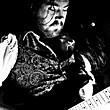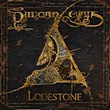|
|

Duncan Evans Old Traditions, New Standards When the guitarist in an avant-garde black metal outfit suddenly shifts gears and turns to the British folk music of the late 60s and early 70s, some will surely shake their heads in disbelief. For Duncan Evans however, the step from A Forest Of Stars to his just released solo album Lodestone hasn't been as big as it might look from an outside perspective. Recently he took the time to answer Luna Kafé's questions - late at night, sitting in an armchair in his dimly lit living room, with Eberhard Weber's jazz sounds on the stereo. LK: Musically, this album is pretty much a U-turn compared to the sound of A Forest Of Stars. Was trying to get away
as far as you could musically from that band kind of the idea behind this solo record? Duncan: The album was recorded without metronome click-tracks, and this has a significant impact on the "feel" of the performances, allowing the tempo of teach song to vary in what I hope is a natural and flowing manner. I think that, where possible, music should be allowed to "breathe" and to find its own pace and groove without the aid of a metronome. I am glad you have picked up on this. LK: The album has a very distinctive sound. It that something that just evolved over time or was there some kind of "master plan" involved, to concentrate on the interplay of acoustic and electric guitar as the focal point? Duncan: Whilst I knew that I wanted the album to be anchored by a predominantly "acoustic" sound, as the production process unfolded - whilst the acoustic guitar and vocal parts were being recorded - I decided that augmenting the arrangements with some subtle electric guitar overdubs and female backing vocals was something I would do as a way of providing some extra light and and shade, and melodic and harmonic interest, to the recordings. The idea is for the acoustic guitar to provide the main "body" of the music, and for the effected electric guitar to punctuate this by contributing tension and a sense of "atmosphere". LK: What was the biggest challenge when it came to recording this album? Duncan: The process was mostly quite relaxed and easy-going. Rick Blakelock did a great job of helping with the recording process. However, sometimes it's easy to be too self-critical when you're listening back to bare and unprocessed recordings of your own playing. This was especially so when recording Lodestone, the bulk of the sound being composed of a single acoustic guitar part. Often it's difficult to be objective and let go of feeling like certain performances are not as perfect as they should be. Of course, the reality is that the overall emotional resonance engendered by music is far more important than whether the players are hitting every single note exactly as planned! LK: Folk music made a bit of a comeback in recent years in various shades and forms. When we say "folk music", what comes
to your mind first? In other words, what does "folk" mean to you?  Duncan: I think I first became more interested in acoustic guitar music as a teenager, as a result of listening to the acoustic
songs in the middle of albums by 60s and 70s heavy rock bands like Led Zeppelin. When I first heard Led Zeppelin's "Black Mountain Side"
I was amazed by the sound and texture being produced by (basically) one acoustic guitar. This was so different from most of what I had
heard before because an alternative tuning was used for the instrument. Of course, it turned out that Jimmy Page had pretty much copied
that song from Bert Jansch's arrangement of Black Waterside. Jansch was of course a member of Pentangle - key figures in the 60s British
folk-rock scene along with Fairport Convention and Steeleye Span etc. Gradually the dots began to join up, and I became just as obsessive
about Richard Thompson as I might previously have been about Black Sabbath.
LK: When it comes to the lyrics - where do you find inspiration for your stories?
Duncan: I think I first became more interested in acoustic guitar music as a teenager, as a result of listening to the acoustic
songs in the middle of albums by 60s and 70s heavy rock bands like Led Zeppelin. When I first heard Led Zeppelin's "Black Mountain Side"
I was amazed by the sound and texture being produced by (basically) one acoustic guitar. This was so different from most of what I had
heard before because an alternative tuning was used for the instrument. Of course, it turned out that Jimmy Page had pretty much copied
that song from Bert Jansch's arrangement of Black Waterside. Jansch was of course a member of Pentangle - key figures in the 60s British
folk-rock scene along with Fairport Convention and Steeleye Span etc. Gradually the dots began to join up, and I became just as obsessive
about Richard Thompson as I might previously have been about Black Sabbath.
LK: When it comes to the lyrics - where do you find inspiration for your stories?Duncan: Sparks of inspiration can come from almost anywhere, if you keep half an eye open for them. For example, the song "Bird of Prey" came about when I drove past a road sign mentioning "birds of prey". The idea of a person who viewed himself (probably delusionally) as a "bird of prey" was ignited. I note down the seeds of ideas such as that as they arrive, and work on building them into finished songs later on. LK: With a sound so sparse, obviously there's extra attention on the lyrics. Did it take a lot of preparation, rehearsal and/or tweaking to perfect them? Duncan: Writing lyrics is something with which it has taken me a long time to get to a stage where I am truly happy with the results. I still find musical parts and melodies much easier than words to compose, and I think I still have a long way to go in honing my lyric-writing! But the more words I write, the faster and more proficient I become at getting ideas out onto the page, and the more satisfied I generally am with the results. With the Lodestone songs, some came together quite quickly and others were rewritten again and again. It's quite possible to stare at a blank page for several hours, and it's equally achievable to have a song fully formed in minutes when the mood is right. LK: We're told you've signed a long-term, five album contract with the label Prophecy - does this imply that you have mapped out a plan, that you at least have a vague idea where this might take you on future records? Duncan: Ideas are beginning to slot into place for the next album after Lodestone. There will be some songs which feature similar instrumentation to those on Lodestone, but I intend to use a larger group of musicians and possibly to play more different instruments myself - at least one some songs. I may not rely so heavily on the acoustic guitar being the main instrument all the time. Although I hope my songs will be identifiable as "me" in some way, and although there will be running themes, I have no desire to restrict myself to only making music in any one specified way. The excitement and inspiration comes from looking ahead and staying free of becoming mired what has come before. LK: Silly last question: Any famous last words? Duncan: A lie told often enough becomes the truth. Copyright © 2013 Carsten Wohlfeld
|
| © 2013 Luna Kafé |